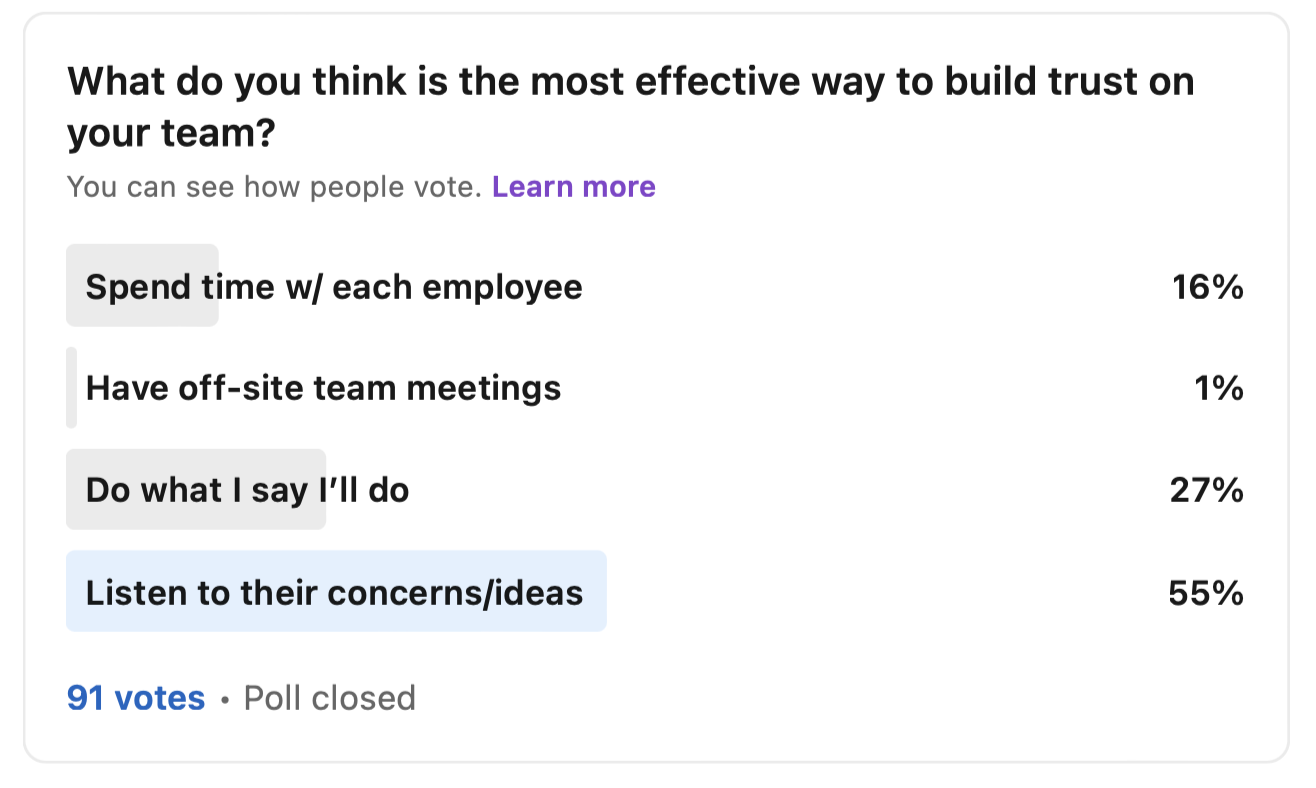How to build team trust: Linkedin Poll

LeaderGov published a poll on LinkedIN recently about how to best build trust on teams. We provided four answer options as to how to build trust. Two answers of the four were far and away the most valued. The chart below shows the results of the poll.

Listen to their concerns / ideas
The largest poll response on building trust had to do with listening to employees' concerns and ideas. Here are some examples and ideas on that important topic.
Listening to employees' concerns is an important aspect of being an effective leader. When employees feel that their concerns are heard and valued, it can lead to increased job satisfaction, higher trust, better performance, and improved retention rates.
Here are some tips on how to listen to employees' concerns as a leader:
- Create an open-door policy: In staff meetings or other venues, ensure your team knows that you are available to listen to their concerns, feedback, and suggestions. Encourage them to approach you and assure them that their concerns will be taken seriously. This helps the employee know they can trust you.
- Practice active listening: When an employee is speaking to you, give them your full attention. This means maintaining eye contact, putting your phone down, avoiding interruptions, and providing nonverbal cues that show you are engaged in the conversation.
- Ask open-ended questions: Transition from giving your opinion on matters to asking employees to share their thoughts and feelings. Do this by asking open-ended questions. This can help you gain trust and a better understanding of their concerns and perspectives.
- Show empathy: Connecting with the situation and feelings of an employee is gold. It shows you care and when done authentically, builds strong trust. Let them know that you understand how they feel and that you are committed to finding a solution.
- Use feedback mechanisms: Implement feedback mechanisms such as suggestion boxes, employee surveys, and regular check-ins to provide employees with an opportunity to share their concerns in a non-threatening way.
- Ensure confidentiality: Sometimes leaders share details about other employees’ attitudes, perspectives or backgrounds that are not relevant or pertinent to others. It’s easy to get loose with sharing others' details, so be sure and keep private communication to a minimum and have the discipline to keep things private when needed.
Doing what I say I'll do
Leaders need to be reminded to do what they promise. They also need to be careful about the promises they make to be sure they can actually keep them. Younger generations especially are seeking authenticity from leaders not just words, but integrity. So, watch your commitments and follow-through. Here are a few other points about accountability:
- Admit Mistakes: Leaders should be willing to admit when they make mistakes. When a leader takes responsibility for their actions, it sends a message that “I trust you enough to share a mistake”. It says “it’s okay to make mistakes”, and it encourages them to do the same.
- Follow Through on Commitments: A leader should always follow through on their commitments. If they promise to do something, they should do everything in their power to make sure it gets done. This shows their team that they are reliable and able to be trusted. If they fall short, they should admit it and share an update on how they intend to finish the job.
- Seek Feedback: Leaders should seek feedback from their team regularly. They should be open to constructive criticism and be willing to make changes based on that feedback. Inviting criticism and other points of view creates a psychologically safe place. When we open ourselves up to others' input, it says “I trust you…I want to hear your perspective.”
- Lead by Example: Leaders should lead by example. They should model the behavior they expect from their team. For example, if a leader expects their team to be punctual, they should be the first one to arrive and the last one to leave.
Building trust requires a serious effort on the leader’s part. Leaders should extend interest and concern for others (in a genuine way) and be careful about and complete the commitments they make. Employees are watching leaders and will often copy the attitudes they see, affecting culture and morale.
For more information on LeaderGov’s leadership programs, please visit us at www.leadergov.com or email us at support@leadergov.com.

